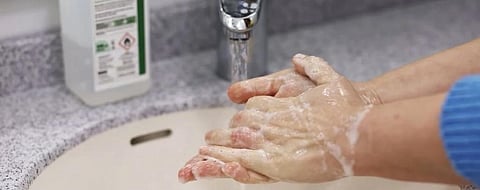Every drop counts in these times of COVID-19
The novel coronavirus disease (COVID-19) pandemic has shocked the whole world with its severity. This pandemic has sickened 3,522,593 and killed 247,744 people worldwide since its appearance.
One of the key recommendations to contain the disease is to wash hands frequently with soap and water. According to guidelines by the World Health Organization, a proper hand wash involves soap and scrubbing hands on both sides for at least 20 seconds.
According to Suresh Kr Rohilla, senior director at Centre for Science and Environment (CSE), every person will need to clean his / her hands at least 10 times a day, instead of a usual average of five times a day in this situation.
Thus, a family of five members would need 100-200 litres of water per day only to wash hands, that will account for a 25 per cent increase in water demand and wastewater generation. This will subsequently result in immense pressure on overstretched water utilities that struggle to meet current water demand.
This will further trigger the exploitation of existing fresh water resources such as more groundwater abstraction.
At the moment, COVID-19 is present in every continent except Antarctica. Washing hands is a difficult challenge in many developing countries and underdeveloped countries. Clean water is often in short supply, and many slum dwellers lack access to clean water.
The report, The Water Gap - WaterAid’s State of the World’s Water 2018, warns that the global population without access to clean water has gone up to 844 million, “which is almost 200 million more than previously counted”.
People who spend more than 30 minutes travelling to procure water are to be considered without access to water. Sunita Narain, director-general, CSE, talks about the grim situation of access of clean water and sanitation.
Her views in ‘Water in the age of coronavirus’ clearly highlight the inequalities in water distribution in India. A big number of people in our cities still do not have access to piped water supply.
Note: DRC: Democratic republic of the Congo
They are either dependent on water tankers or dirty and unreliable water sources for drinking and other needs, which in turn adds to their health burden.
According to Reuters (March 19, 2020), Haiti is struggling to deal with serious outbreaks of disease because of a lack of sanitation infrastructure and inadequate healthcare services.
To observe basic hygiene against the coronavirus, Haitians do not have running water to wash hands frequently with soap and water.
David Feldman, professor of urban planning and public policy and political science, University of California Irvine states that in rural Mexico, some five million people lack access to clean water.
Residents of Flint in the American state of Michigan, who witnessed an infamous case of lead contamination, were advised in August 2019 to boil water as a precaution against impurities after a pipeline rupture reduced pressure in the city’s water lines.
A widespread use of face masks during the COVID-19 outbreak has also resulted in improper handling and disposal. Cases were reported of these masks finding their ways to water bodies. This subsequently can pose a threat to water bodies by contaminating the water with pathogens.
Experts say that there is a bright side of this pandemic too. Coronavirus shutdowns have unintended climate benefits: Cleaner air and clearer water.
COVID-19 lockdowns halted industrial operations and travel within countries. This has resulted in improved environment.
Though the actual data on improvement in the condition of India’s water bodies due to the COVID-19 lockdown is yet to come, it is visually evident that the shutting down of industrial activities, tourism activities, less solid waste burden on storm water drains and open water bodies will help to revive these water bodies.
Narain says that the most important lesson to be learnt during this current pandemic is that we need to ensure everybody has access to clean water. Inarguably, we need to sustainably manage our water resources to make it affordable for all.
We need to find out more technological options for less consumption of water. A new approach is needed to be adopted for restoration and rejuvenation of water bodies, rainwater harvesting, decentralised wastewater treatment and resource recovery and reuse.
We can’t afford to forget that “Every drop counts”.


